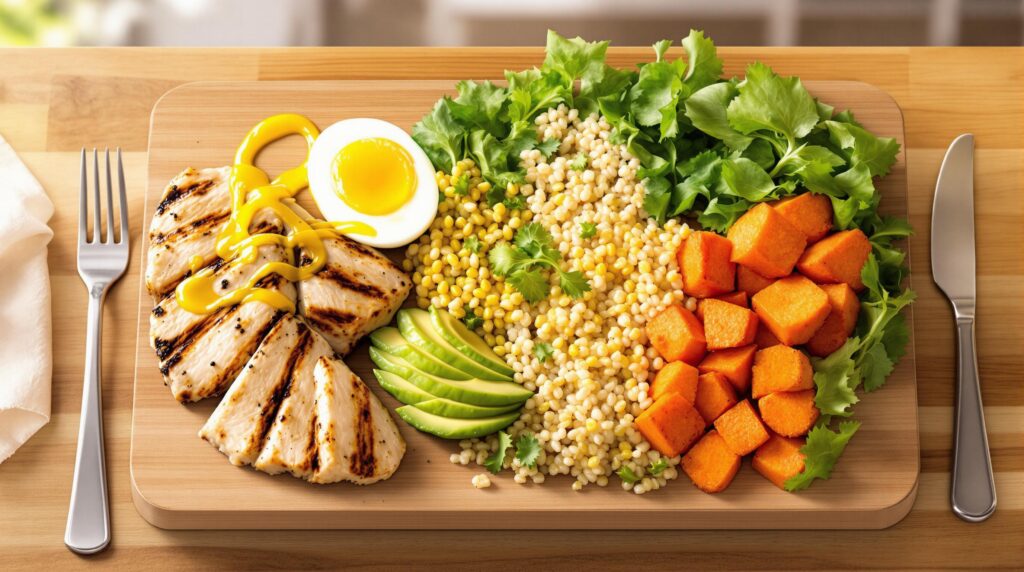Are you ready to find out how changing your diet can boost your energy and focus? Starting a low carb diet can help you lose weight and feel more alive. It can also improve your mental clarity, leading to many health benefits.
We’ll look at how a beginner low carb diet can increase your metabolism and give you energy all day. It’s important to know how this diet works and its benefits. Before starting, talk to a healthcare professional to make sure it’s right for you. Ready to learn more? Let’s explore the connection between carbs, energy, and your health by diving into low carb diets.
Understanding the Basics of a Low Carb Diet
Starting a low carb diet can feel overwhelming at first. It’s important to learn the low carb diet basics for beginners to make good choices. By eating fewer carbs, your body uses fat for energy, leading to health benefits.
What is a Low Carb Diet?
A low carb diet means eating less than 130 grams of carbs a day. It focuses on proteins and healthy fats, cutting down on grains, fruits, and sugars. This helps your body burn fat better, aiding in weight control and health.
Benefits of Reducing Carbohydrates
The benefits of reducing carbohydrates are clear. This diet can help you:
- lose weight by burning more fat.
- keep blood sugar levels stable, good for diabetics.
- feel fuller longer with more protein and fat.
These benefits make a low carb diet attractive to many. Knowing these advantages can encourage you to stick with it.
Common Misconceptions
Despite its popularity, there are common misconceptions about low carb diets that might stop people from trying it. Some think it’s hard to follow or lacks nutrients. But, done right, a low carb diet can be balanced and meet your nutritional needs. Learning the truth can help you start a healthier life without obstacles.
How to Get Started with a Low Carb Diet
Starting a low carb diet is both exciting and challenging. It’s important to set realistic goals. Think about what you want to achieve, like losing weight or feeling more energetic.
Setting Realistic Goals
Make sure your goals are achievable. Aim for small steps instead of big changes. For example, try to cut down on carbs by a certain amount each week. This helps you stay on track and enjoy your new diet.
Meal Planning Essentials
Good meal planning is key to a low carb diet. Include proteins, healthy fats, and low-carb veggies in your meals. This keeps your diet balanced and tasty. Plan your meals ahead to avoid unhealthy choices.
Creating a Shopping List
A good shopping list helps you buy the right foods. Choose proteins like chicken and fish, and healthy fats like avocados. Also, pick low-carb veggies like leafy greens. Avoid high-carb foods to stay on track.

Foods to Include in Your Low Carb Diet
Creating a low carb meal plan for beginners means focusing on nutrient-dense foods. It’s key to choose the right protein sources for a low carb diet. This not only makes your meals better but also boosts your health. Adding healthy fats for energy keeps you full and energized all day. Here’s how to start building your meals.
Protein Sources to Prioritize
Choosing the right protein sources is vital for your low carb meal plan. Look for options that are high in protein but low in carbs. Some great choices include:
- Chicken breast
- Lean cuts of beef
- Fatty fish like salmon or mackerel
- Plant-based proteins such as tofu and tempeh
Healthy Fats for Energy
Healthy fats are key in a low carb diet. They give you the energy you need and help you feel full. Consider adding:
- Avocados, which are rich in monounsaturated fats
- Nuts and seeds, such as almonds and chia seeds
- Olive oil, perfect for salad dressings and cooking
Low Carb Vegetables You’ll Love
Vegetables are also important in your diet. They provide vitamins and minerals without extra carbs. Some tasty low carb veggies include:
- Leafy greens like spinach and kale
- Cruciferous vegetables such as broccoli and cauliflower
- Zucchini and bell peppers

Foods to Avoid on a Low Carb Diet
Starting a low carb diet means you need to be careful about what you eat. You should avoid foods high in carbs to stay on track and improve your health. Knowing which carbs to limit helps you make better choices.
High-Carb Foods to Eliminate
To meet your low carb goals, remove foods with too many carbs. Here are some common ones to avoid:
- Breads and rolls
- Pasta
- Rice and other grains
- Potatoes and sweet potatoes
- Sugary snacks and pastries
Hidden Sugars in Everyday Products
Watch out for hidden sugars in everyday items. These can sneak up on you and affect your carb intake. Look at labels for:
- Condiments like ketchup and barbecue sauce
- Some salad dressings
- Certain yogurts and smoothies
- Beverages, like flavored or sweetened drinks
Knowing about these hidden sugars is key to a low carb diet. Always read labels to stay on track with your diet.

How a Low Carb Diet Impacts Your Energy Levels
Starting a low carb diet can really change how you feel. It helps keep your blood sugar stable and changes what your body uses for energy. This leads to more consistent energy, which can make you feel better and perform better.
Stabilizing Blood Sugar
A low carb diet helps control insulin, which is key for stable blood sugar. By eating fewer carbs, you avoid the energy ups and downs that high-carb diets cause. This means you can stay energized all day, which can make you more productive and less tired.
Increasing Your Endurance
Switching to fat for energy can boost your stamina. Many people find they can do more during workouts or daily activities. This is great for athletes or anyone who exercises a lot, as it can really improve their performance.
Studies show that people on low carb diets use more energy than those on high carb diets. For example, one study found that low carb dieters burned up to 278 kcal/d more. You can learn more about this in a study here.
The Role of Ketosis
Ketosis is a big part of low carb diets. It makes your body good at turning fat into energy, which is helpful during long activities. This means you use less carbs and burn more fat, which can give you steady energy and clear thinking.

Enhancing Mental Focus Through a Low Carb Diet
Starting a low carb diet can bring many benefits, including better mental clarity and focus. The link between carbs and brain function is key. Lowering carb intake helps keep blood sugar stable, which boosts brain performance.
How Carbohydrates Affect Brain Function
Carbs are the brain’s main energy source. But too many can cause energy highs and lows, making it hard to focus. Eating fewer carbs lets the brain use ketones instead, leading to more stable energy and less distraction.
The Benefits of Ketones for Cognition
Switching to a low carb diet can greatly improve mental focus. Ketones provide steady energy for the brain. Studies show that people on low carb diets often see better clarity, memory, and overall brain function. This makes a low carb diet a great way to enhance mental sharpness.
Tips for Staying On Track
Staying focused on a low carb diet can be tough, with cravings for high-carb foods. Using smart strategies can help you manage cravings and stay on track. Meal prep is a key part of success on this diet.
Managing Cravings and Temptations
Cravings are normal when starting a low carb diet. Here are some tips to help:
- Keep healthy snacks on hand: Nuts, cheese, or hard-boiled eggs can help when you’re hungry.
- Stay hydrated: Sometimes, thirst can feel like hunger. Drinking water can help.
- Plan indulgences: Having a small treat now and then can keep you from feeling too restricted.
Meal Prep Tips for Success
Good meal prep is key to making your low carb diet easier. Here are some ideas:
- Batch cook: Cook lots of your favorite low carb dishes and freeze them for later.
- Pre-pack snacks: Put healthy snacks in containers for easy grabbing.
- Organize your fridge: Store your low carb meals where you can see them to grab them quickly.
Common Challenges and Solutions
Starting a low carb diet comes with its own set of challenges. Knowing these challenges can help you deal with them better. Issues like the keto flu and handling social situations on a low carb diet are common. Understanding these will help you prepare for your diet journey.
The Keto Flu: What to Expect
The keto flu is a set of symptoms that happen when your body starts using ketosis. Symptoms include fatigue, headaches, irritability, and muscle cramps. These happen because your body is learning to use fat for energy instead of carbs. To feel better, drinking lots of water and keeping your electrolytes balanced is key. Ways to lessen keto flu symptoms include:
- Drinking plenty of water to stay hydrated
- Incorporating electrolytes like sodium, potassium, and magnesium
- Gradually lowering carb intake instead of cutting it all at once
Dealing with Social Situations
Social events can be hard when you’re on a low carb diet. Food-focused gatherings might tempt you to stray from your diet. To handle these situations, it’s important to talk about your diet openly. Here are some tips:
- Plan ahead and check out menu options before going out
- Bring a low carb dish to share at parties
- Tell your friends or family about your diet; they might offer suitable options
By getting ready for the keto flu and figuring out social situations, you can do well on your low carb diet.
Staying Motivated on Your Low Carb Journey
Starting a low carb journey can seem overwhelming. It’s key to stay motivated to reach and keep your goals. Tracking your progress and joining a supportive community can boost your spirits and keep you on track.
Tracking Your Progress
Tracking your low carb diet is more than just watching your weight. Keep a record of:
- Your daily food intake
- Energy levels throughout the week
- Mental clarity and cognitive function
- Physical activities and accomplishments
Using a journal or app can show your progress. Celebrating small wins, like better energy or clearer thinking, keeps you motivated.
Finding a Support System
Having support on a low carb diet makes a big difference. Join online forums, local groups, or social media to connect with others. Talking about recipes, challenges, and successes builds a sense of community. A strong network provides encouragement, advice, and motivation when you need it most.
Combining tracking your progress and community support can greatly help. With the right mindset and resources, your low carb journey becomes an exciting journey, not a chore.
Long-Term Sustainability of a Low Carb Diet
Starting a low carb diet is just the first step. It’s about changing your lifestyle, not just dieting for a short time. This journey requires patience, planning, and a deep commitment to living healthy.
It’s important to understand how to balance your diet on a low carb plan. You need to eat a variety of high-quality proteins, healthy fats, and low-carb veggies. As you reach your goals, slowly add back some carbs in small amounts. This keeps your diet interesting and flexible.
Enjoying the process of cooking and trying new flavors is key. It makes your meals not just nourishing but also enjoyable. Exploring new recipes and ingredients keeps your diet exciting. This approach helps you stay on track and thrive on your low carb diet.



